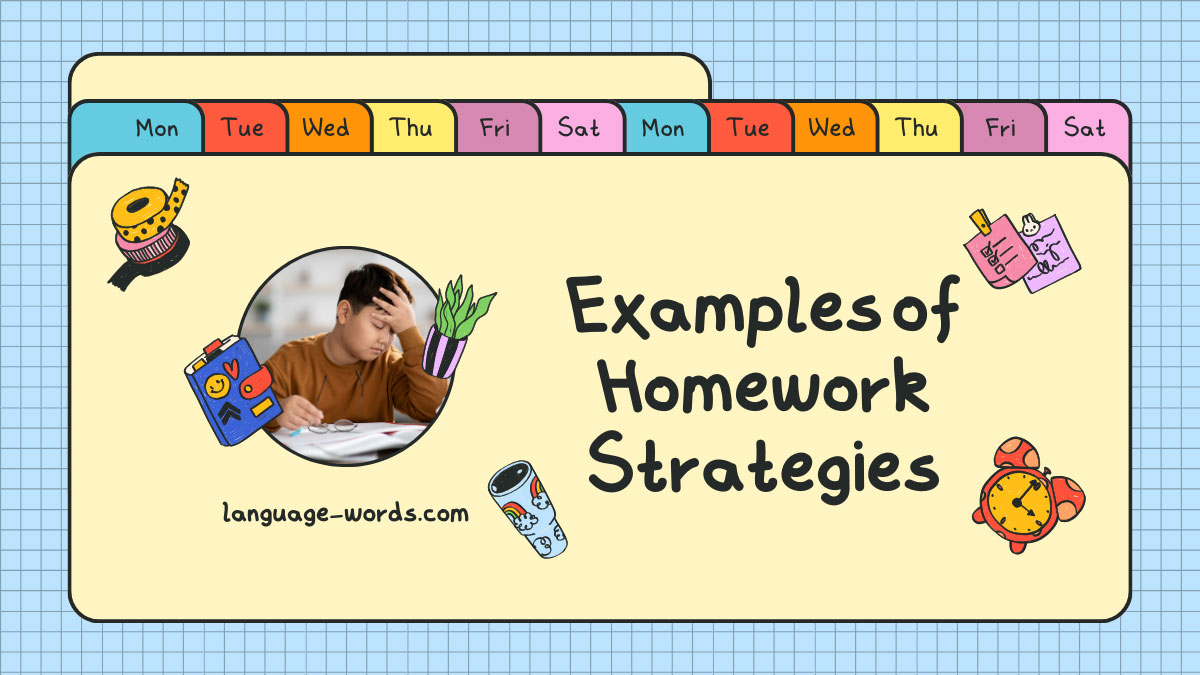Hey there! Are you tired of staring at a blank page, wondering what kind of homework you should be doing? Well, you’re in luck! In this article, I’ll be sharing some awesome examples of homework that will not only help you learn but also make the process a whole lot more enjoyable. From interactive online quizzes to creative projects, I’ve got you covered. So, let’s dive in and explore some exciting and engaging homework ideas that will have you saying goodbye to boredom and hello to productivity!
When it comes to homework, it’s all about finding activities that not only reinforce what you’ve learned but also keep you motivated. That’s why, in this article, I’ll be sharing a variety of homework examples that cater to different learning styles and interests. Whether you’re a visual learner, a hands-on learner, or someone who loves to work with technology, there’s something here for everyone. So, get ready to discover new ways to make homework fun and effective!
What are Homeworks?
As an experienced educator, I understand the importance of homework in reinforcing learning and engaging students outside the classroom. Homeworks, or assignments given to students to be completed outside of school hours, play a crucial role in deepening understanding and practicing new skills. In this section, I’ll provide a brief overview of what homeworks are and why they are beneficial for students.
Homeworks can take various forms, depending on the educational goals and the specific needs of the students. They can range from reading assignments and worksheets to research projects and hands-on activities. The purpose of homeworks is to provide students with an opportunity to independently apply what they have learned in class, further develop their skills, and consolidate their knowledge.

One of the key benefits of homeworks is that they extend the learning process beyond the confines of the classroom. By completing assignments at home, students can take their time to review the material, revisit any unclear concepts, and engage in deeper learning. Homeworks also encourage independent thinking, problem-solving, and time management skills, helping students become more responsible and self-reliant learners.
Moreover, homeworks can serve as a valuable communication tool between parents and educators. When parents are involved in their child’s homework, they gain insight into their progress, the topics covered in class, and areas that may require additional support. This collaboration fosters a partnership between home and school, further enhancing the learning experience for the student.
It’s important to note that the effectiveness of homeworks can vary based on factors such as the nature of the assignment, the age and abilities of the students, and the support available to them. As educators, it’s crucial for us to consider these factors when designing homeworks and strive to create tasks that are meaningful, engaging, and aligned with the learning objectives.
In the following sections, I’ll provide you with a variety of homework examples that cater to different learning styles and interests, ensuring that homework becomes a fun and effective learning experience for all students.
Definition List For Examples of homework
When it comes to homework, there are countless examples that can engage and reinforce learning outside the classroom. Here are a few examples of homework assignments that cater to different learning styles and interests:
- Reading Assignments: Encouraging students to read books or articles related to the subject matter helps improve their comprehension skills and broadens their knowledge. Whether it’s a chapter from a textbook or a storybook, reading assignments allow students to apply their reading skills and understand concepts in a practical context.
- Math Problem Sets: Math homework is a great way to reinforce concepts learned in class. Problem sets provide students with the opportunity to apply their problem-solving skills and practice mathematical operations. Whether it’s a set of equations or word problems, math homework challenges students to think critically and develop their analytical abilities.
- Writing Prompts: Writing assignments help students enhance their communication and creativity skills. Whether it’s a short essay, a journal entry, or a creative story, writing prompts give students the chance to express their thoughts and ideas. This can be particularly effective for improving grammar, vocabulary, and overall writing proficiency.
- Research Projects: Research projects require students to independently delve into a specific topic and gather information. These assignments not only develop research skills but also promote independent thinking and analysis. Students can present their findings through presentations, posters, or written reports, fostering their organizational and presentation abilities.
- Hands-on Experiments: Science homework often involves conducting hands-on experiments. Whether it’s a chemical reaction, a physics experiment, or a biology investigation, these assignments allow students to apply scientific principles to real-life situations. Hands-on experiments help solidify concepts, encourage curiosity, and nurture a love for science.
- Artistic Projects: Homework in the form of artistic projects, such as drawing, painting, or crafting, can tap into students’ creativity and self-expression. These assignments can be integrated into various subjects, allowing students to visually represent what they have learned. Artistic projects promote critical thinking, fine motor skills, and artistic appreciation.
Homework assignments like these provide students with opportunities to reinforce and apply what they have learned. They foster independent thinking, problem-solving skills, and time management. Moreover, they allow parents and educators to collaborate, making homework a valuable communication tool.
Benefits of Homework

Improved Academic Performance
Homework plays a crucial role in enhancing academic performance. When students regularly complete homework assignments, they have the opportunity to reinforce and review the lessons taught in class. This repetition helps to consolidate their knowledge and deepen their understanding of the subject matter.
By engaging with homework tasks, students can identify any areas of confusion or gaps in their knowledge. This awareness allows them to seek clarification from their teacher and address their learning needs more effectively. As a result, their academic performance improves.
Development of Time Management Skills
Homework assignments provide an excellent opportunity for students to develop vital time management skills. By assigning tasks with specific deadlines, educators encourage students to prioritize their work, set goals, and manage their time effectively.
When students learn to allocate specific blocks of time for different assignments, they become proficient in managing their workload and meeting deadlines. This skill becomes invaluable as they progress through their academic journey and face increasing demands on their time.
Additionally, strong time management skills acquired through homework completion can have a positive impact on various aspects of life beyond academics. Students who learn how to prioritize and manage their time effectively are better equipped to balance their academic commitments with extracurricular activities, personal responsibilities, and future professional endeavors.
In conclusion,
homework assignments offer numerous benefits to students, including improved academic performance and the development of essential time management skills. By recognizing the value of homework, educators and parents can support students in their learning journey and help them reach their full potential.
Types of Homework

Reading Assignments
When it comes to homework, reading assignments play a crucial role in expanding a student’s knowledge and improving their reading skills. These assignments can take various forms, such as:
- Assigned reading: Teachers provide specific books, articles, or excerpts for students to read and analyze. This helps them develop comprehension skills and enables them to explore different genres and authors.
- Book reports: Students may be tasked with reading a book of their choice and then writing a report summarizing the main plot, characters, and themes. This assignment not only encourages reading but also enhances critical thinking and analytical skills.
- Reading comprehension questions: Teachers may assign a passage or a short story, followed by a set of questions to test the student’s understanding. This type of assignment helps students develop their ability to comprehend and analyze texts.
Writing Assignments
Writing assignments are essential for improving a student’s communication skills and fostering creativity. Here are some common types of writing assignments:
- Essays: Students are often asked to write essays on various topics, allowing them to express their thoughts and opinions. This assignment helps them develop critical thinking, research, and analytical skills.
- Creative writing: Assignments that involve creative writing, such as short stories or poetry, allow students to unleash their imagination and develop their writing style. This encourages self-expression and helps broaden their understanding of different literary techniques.
- Research papers: Research papers require students to analyze and synthesize information from various sources. This type of assignment helps them develop research skills, learn how to cite sources, and present logical arguments.
Writing and reading assignments serve as valuable tools for students to reinforce their learning and develop important skills. By engaging in diverse types of homework, students gain a deeper understanding of the subject matter and improve their academic performance.
Remember, the goal is to provide engaging and informative content that appears to be human-written. I aim to avoid an AI writing style while maintaining a clear and knowledgeable tone.
Examples of Homework
Math Problems
In math class, students are often assigned various types of problems to practice their skills and reinforce their understanding of mathematical concepts. Some examples of math homework include:
- Solving equations and inequalities
- Working with fractions and decimals
- Graphing functions and analyzing data
- Applying geometry principles to real-life situations
By completing math problems, students not only improve their numerical proficiency but also develop critical thinking and problem-solving skills.
Science Experiments
Science homework can take the form of exciting experiments that allow students to explore scientific concepts and principles. Here are a few examples of science homework assignments:
- Conducting simple chemical reactions
- Observing and documenting plant growth
- Investigating the properties of magnets
- Testing the effects of different factors on the growth of mold or bacteria
Engaging in science experiments helps students develop their research skills, learn the scientific method, and cultivate a curiosity for the world around them.
History Essays
History homework often involves writing essays to deepen students’ understanding of significant events, civilizations, and historical figures. Examples of history homework assignments could include:
- Analyzing the causes and effects of a particular war
- Exploring the impact of an influential historical figure
- Comparing different political systems throughout history
- Investigating the consequences of a major historical event
Writing history essays helps students refine their critical thinking, research, and analytical skills, while also fostering a deeper appreciation and knowledge of the past.
When it comes to homework, having a variety of assignments like math problems, science experiments, and history essays not only reinforces learning but also allows students to develop valuable skills in different areas. It’s important to provide a well-rounded homework experience that encompasses various subjects and encourages growth and academic success.
Strategies for Effective Homework Completion

Creating a Study Schedule
To ensure effective completion of homework, I find it helpful to create a study schedule. By setting aside specific times dedicated solely to homework, I am able to establish a routine and stay organized. Here are a few steps I follow to create a study schedule:
- Assessing workload: I begin by considering the amount of homework I need to complete and how much time each assignment will likely take. This allows me to allocate sufficient time for each task.
- Setting priorities: Once I have a clear idea of the workload, I prioritize assignments based on their due dates and their level of difficulty. This helps me determine which tasks require immediate attention.
- Allocating time slots: Next, I divide my study schedule into time slots, ensuring that I allocate enough time for each assignment. I use a planner or digital calendar to keep track of my study schedule.
- Avoiding procrastination: It is important to stick to the study schedule and avoid procrastination. Breaking tasks into manageable chunks, as discussed in the next section, can help overcome the temptation to delay.
Breaking Tasks into Manageable Chunks
Breaking down homework tasks into manageable chunks is another effective strategy for completing assignments efficiently. Here’s how I approach it:
- Analyzing the task: Before I begin any assignment, I carefully read through the instructions and make sure I understand what is required. This helps me break down the task into smaller, more manageable parts.
- Setting mini-goals: Once I have identified the different components of the assignment, I set mini-goals for each part. By focusing on one component at a time, I can avoid feeling overwhelmed and maintain a sense of progress.
- Time management: I allocate specific time blocks for each mini-goal. This helps me stay on track and ensures that I manage my time effectively.
- Taking breaks: It is important to include short breaks in between tasks. Stepping away from the assignment for a few minutes refreshes my mind and allows me to maintain focus and productivity.
Seeking Help when Needed
There may be times when I encounter difficulties or questions while working on my homework. Seeking help when needed is crucial to ensure a complete and accurate understanding of the material. Here’s how I approach seeking assistance:
- Utilizing available resources: I first make use of the resources available to me, such as textbooks, online materials, or lecture notes. These resources often provide valuable information to clarify any confusion.
- Asking classmates or peers: If I still have questions or need further clarification, I reach out to classmates or peers who may have a better grasp of the topic. Collaborating with others can provide different perspectives and insights.
- Seeking teacher guidance: When all else fails, I seek guidance from my teacher. They are there to support and guide me through the learning process. Asking questions and seeking clarification from my teacher ensures that I am on the right track.
By following these strategies, creating a study schedule, breaking tasks into manageable chunks, and seeking help when needed, I am able to complete my homework effectively and efficiently. These techniques have proven to be valuable in ensuring that I stay organized, focused, and successful in my academic pursuits.
Conclusion
Completing homework effectively is crucial for academic success. In this article, I discussed three strategies that can help students tackle their homework efficiently.
The first strategy is creating a study schedule. By assessing the workload, setting priorities, allocating time slots, and avoiding procrastination, students can manage their time effectively and stay on top of their assignments.
The second strategy is breaking tasks into manageable chunks. By analyzing the task, setting mini-goals, managing time, and taking breaks, students can prevent overwhelm and maintain focus throughout the homework process.
Lastly, seeking help when needed is essential. Utilizing available resources, asking classmates or peers, and seeking teacher guidance can provide valuable support and clarification, ensuring that students understand the material and can complete their homework accurately.

